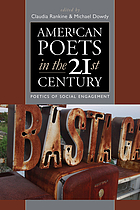(click on image to enlarge)
(click on image to enlarge)
Type in your search terms.
(click on image to enlarge)
Search for works by Keyword or Subject Term.
Type in a poet's name, a book title, a poetry style or movement, or a relevant keyword combination for a list of titles:
Or, go to advanced search and enter poetry as subject. That returns nearly 3,000 print and ebooks. Other subject examples:
English poetry
Women--Poetry
You can also browse the shelf virtually! Try this:
 American Poets in the 21st Century: The Poetics of Social Engagement
by
American Poets in the 21st Century: The Poetics of Social Engagement
by
Extend your search for criticism beyond the Holman Library collection.
Search in WorldCat, a catalog of world libraries, and Google Scholar. Borrow articles for free with InterLibrary Loan.
The Explicator focuses on close readings of literary works. Articles in The Explicator may be helpful for your analysis of a literary work and they provide a good example of how to explicate literary texts.
excerpt from a scholarly article about Citizen: An American Lyric
From "Towards a Poetics of Racial Trauma: Lyric Hybridity in Claudia Rankine's Citizen" by Mary-Jean Chan.
"I argue that Citizen is Rankine's attempt at creating a poetics of racial trauma which meditates on the effects of racial injustice as it manifests in the bodies of traumatized individuals. I draw upon theorists such as Judith Butler and Cathy Caruth whose work bears testament to how trauma often begins and ends with language (or its lack thereof), since moments of linguistic hurt tend to revisit individuals via memory as speech. Rankine's keen awareness of how linguistic injury registers in the body leads her to an adoption and adaptation of the lyric form, with Citizen aptly subtitled "An American Lyric."
Chan, Mary-Jean. "Towards a Poetics of Racial Trauma: Lyric Hybridity in Claudia Rankine's Citizen." Journal of American Studies, vol. 52, no. 1, 2018, pp. 137-163. ProQuest
Literary criticism is analysis, interpretation and evaluation of authors and their works of literature, which can include novels, short stories, essays, plays and poetry.
Critical analysis is often written by literary critics and is found in essays, articles, books and audiovisual sources. Some criticism is created for a mainstream audience, while scholarly criticism is meant for an academic audience.
Literary "criticism" is not necessarily negative; "criticism" means a thoughtful critique of an author's work or an author's style in order to better understand the meaning, symbolism or influences of a particular piece or a body of literature.
For your poetry analysis, use literary criticism to help you better understand your poems. Remember, your main focus is discussion of your poems, not the criticism itself.
Please note: While you may find criticism of the specific poems you are analyzing, cast your research net wide and look for criticism on the author's work as a whole, on specific themes in the author's work, on other poems by that author, or on a literary movement or moment your author is part of. And then synthesize those relevant ideas into your analysis and discussion of Your text.